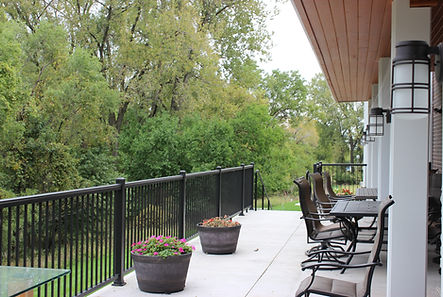
Click the YouTube links for your answers!
➢ What is Cooperative Living - 3:45
➢ Being a Member in Cooperative Living for Active Seniors - 3:24
➢ Lifestyle and Benefits of Cooperative Living - 2:32
➢ Downsizing to a Larger Life - 6:24
➢ Steps to Take for the Big Move - 3:03
What is a Co-op?
A cooperative (CO-OP) is joint ownership in a housing development in which members own a share. Members or share owners are a part of the cooperative, which owns the building, land and common areas. The share’s value is based on the size and type of home. Members pay a monthly fee, which covers the cooperative’s monthly operating costs, including principle, interest, taxes, reserves, maintenance and utilities. Cooperative housing moves ideals into action for the good of the members.
Cooperatives bring back the spirit of community and sociability. The participatory nature of a cooperative enhances the lives of its members and contributes to healthier living. While members can enjoy the privacy of their individual home, there are many opportunities for social involvement with other members who have similar interests. This may take the form of running for the Board of Directors, participating on a committee, attending social programs or joining with friends in daily leisure activities, such as: playing cards, group exercise or golf.
Cooperatives offer maintenance-free-living. You can leave for the winter or go on any extended vacation and know that your home will be safe and secure when you return.




How does a Co-op differ from a condominium, town-home, or rental?
COOPERATIVE
Participating in a coop is different than buying a condominium or a town-home, in that with a cooperative, you are a shareholder of the entire community. You have *(rights to a proprietary lease), but are an investor in the building rather than the outright owner of the unit in which you reside. As a cooperative member, you are also responsible for building maintenance fees which include lawn care, snow removal and general building and ground maintenance, utilities, taxes, renovations and replacements and staff/management company salaries. Cooperative members enjoy the tax benefits of a homeowner.
Cooperatives may have a strict approval process for membership. Most include financial and criminal background checks. They may require applicants to come before the board for an interview. The board’s decision to approve or deny any application is final.
CONDOMIUM
Condominiums (condos) differs from cooperatives in that when you purchase a condominium, you actually own the unit in which you live. There is still a monthly fee with a condo, but it is significantly lower than with a co-op. You are paying only for maintenance. Since you own your condominium, you have the flexibility to rent the home to someone else if you desire. You do not have to have board approval. Condominium owners enjoy the tax benefits of a homeowner.
Condominium living is fairly care-free, but does not typically offer on-site management or the social or community benefits that come with a cooperative. Condos don’t generally have common gathering areas, but may have a clubhouse available.
TOWN-HOMES
When you purchase a town-home or townhouse, you own the unit in which you live and the land it is on. There is no monthly fee with a townhouse, but it is not a carefree lifestyle. You are responsible for all the upkeep and renovations of your property. Townhouses don’t generally have common gathering areas, but may have a clubhouse available.
Townhouse owners enjoy the tax benefits of a homeowner.
RENTAL
Renting a living space is usually the simplest process. What you see is what you get. To rent a unit, you generally need to sign a 6- or 12-month lease, after which time you may or may not need to sign another lease, or be able to continue living in the space on a month-to-month basis. Usually you need to agree to a 30-day notice of vacating the space. Utilities and maintenance are determined before the rental agreement is signed. There are generally no tax benefits to renting.
